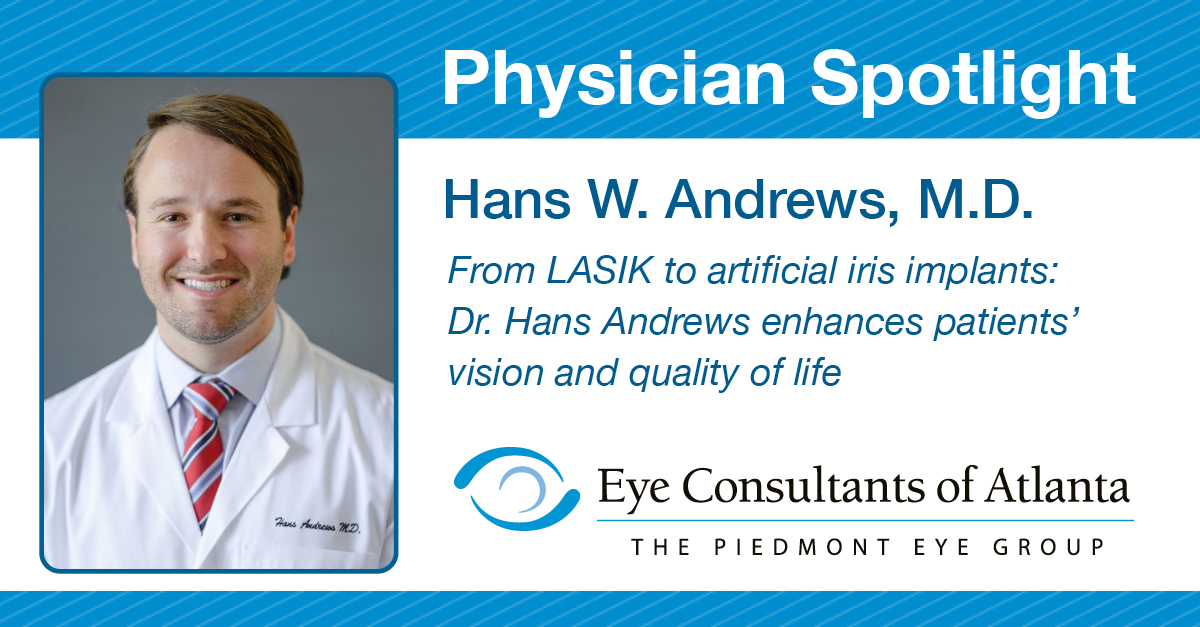Dr. Hans Andrews was arguably destined to become an ophthalmologist. As a child, his parents videotaped him proclaiming it would one day be his career.
While exploring other options in medical school, he found himself drawn to ophthalmology after all. And he soon fell in love with the surgery side of the specialty, a passion he continues holding onto today.
“I found out that I had a gift using my hands,” Dr. Andrews explains, “and I wanted to use that gift to make peoples’ lives a lot better.”
Trained to specialize in the front part of the eye, Dr. Andrews is a cornea, cataract, and refractive surgeon. This finds him performing various surgeries, including a sizable amount of LASIK procedures.
LASIK, a type of refractive surgery, uses a laser to change the shape of a patient’s cornea to treat vision problems caused by refractive errors such as nearsightedness, farsightedness, and astigmatism. When an eye doesn’t bend light properly, LASIK can improve the way light rays focus on the retina. LASIK may reduce a patient’s need for eyeglasses or contact lenses. In some cases, they may no longer need corrective eyewear at all.
“LASIK has been revolutionary for many of our patients, who were super dependent on glasses and contacts,” he explains. “They love the idea of not having to put on their glasses or contacts in the middle of the night and being able to clearly see their alarm clock first thing in the morning. Today, the LASIK technology has gotten so advanced that we’re able to provide them with 20/20 vision, if not a little bit better.”
For example, Dr. Andrews recalls a recent patient with debilitating myopia, who could barely see anything beyond a few of inches in front of her face. After LASIK surgery, he says she has no dependence on glasses whatsoever with perfect vision, both near and far.
“Now she wakes up in the morning everyday with great vision,” he says. “She’s simply blown away by the quality.”
With its swift, visual recovery and less than a 1% chance of complications, LASIK remains one of Dr. Andrews’ favorite procedures to perform.
Dr. Andrews also finds great satisfaction performing artificial iris implantation, a rare form of surgery for patients who experienced trauma to the iris or were born without any iris tissue.
Approved by the FDA in 2018, artificial iris implantation provides great relief for those in need, who often experience debilitating pain and glare, which affects their overall vision. Not only does the procedure help restore sight, it can improve the appearance of the eye as well.
Due to it being a relatively new and complicated technology, artificial iris implantation training is difficult to coordinate. Fortunately for Dr. Andrews, Dr. Stephen Hamilton, a former Eye Consultants of Atlanta ophthalmologist and veteran of the procedure, offered to train Dr. Andrews in artificial iris implantation prior to his retirement. Currently, Dr. Andrews is one of only a few physicians in the state who offer the procedure.
“In the past, we didn’t really have much we could do for patients,” Dr. Andrews says. “Today, we have the option to do a customizable artificial iris transplant. During the pre-op period, I take a picture of the patient’s good iris and send it to the company that makes these artificial irises. We can essentially match it almost perfectly, resulting in an excellent cosmetic outcome.”
Recently, Dr. Andrews treated a patient whose cornea had been pierced by a nail. His symptoms included a persistent glare and a debilitating, extreme sensitivity to light. After the artificial iris implantation, the patient is now experiencing improved eyesight without the glare and photophobia.
“He has a newborn,” Dr. Andrews says. “Now he doesn’t have to wear sunglasses 24/7, and he can enjoy seeing his new baby. He’s incredibly happy with the outcome.”
Whether it’s performing LASIK surgery, artificial iris implantation, or other anterior eye surgeries, Dr. Andrew’s childhood dream of becoming an ophthalmologist keeps reaping rewards for both patients and the physician himself.
“I ultimately chose to become an ophthalmologist, because I saw what a difference it can make,” he explains. “I enjoy the smiles on my patients’ faces and the stories they share about how it’s changing their lives. It’s really satisfying as a surgeon to be able to help them with that.”

